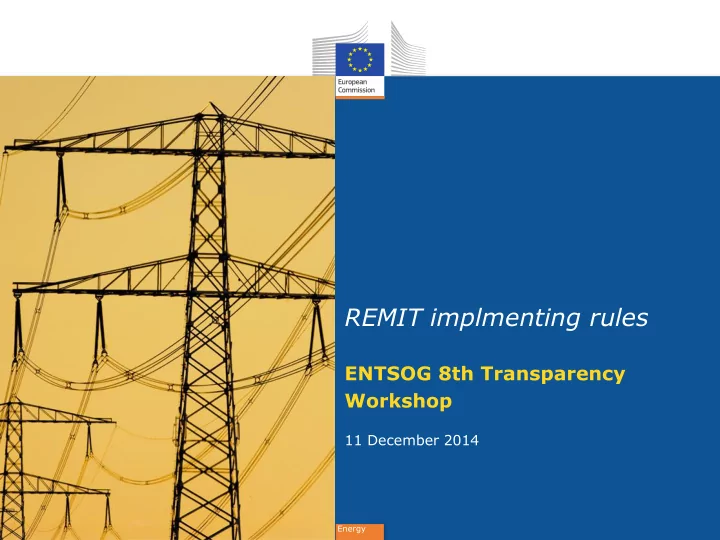

REMIT implmenting rules ENTSOG 8th Transparency Workshop 11 December 2014 Energy
REMIT – Key measures Energy
REMIT – data sources Transaction Fundamental data data ACER data base Article 8(6) of REMIT Article 8(2) of REMIT Production • Transportation • Contracts • Storage • Orders • LNG • Regulation 715/2009 EMIR & MiFID & 543/2013 Energy
List of reportable contracts • Wholesale energy transactions and derivatives • standard & non-standard transactions • >600 GWh final consumer contracts • Transportation contracts and derivatives • Primary allocation of capacities • Secondary trades • No regular reporting for • OTC intragroup transactions • small producers • Balancing contracts Energy
Details of transactions • Required details listed in Annex • Table 1 standard transactions • Table 2 non-standard transactions • Table 3 transportation contracts – electricity • Table 4 transportation contracts - gas • ACER to provide for a user manual Energy
Reporting logic • No double reporting under EMIR/MiFID(R) and REMIT • Trade repositories and financial regulators to provide derivative transaction data to ACER • No additional/different data be required by ACER (except for orders) • Trades on organised markets to be reported through the market place or other facilitators • including orders to trade • OTC trades to be reported by market parties or third parties on their behalf Energy
Reporting of fundamental data • ACER and Regulators to receive from: • ENTSOs direct access to transparency platforms • TSOs Auction results + Individual nominations • LNG facilities use of terminals, unavailabilities • Storage facilities individual nominations, stock data, unavailabilities • Market parties to provide ACER with web feeds of disclosed inside information Energy
Reporting requirements • ACER to develop technical requirements for reporting parties: • Continuity, completeness, reliability, security , etc. of data transfer • Reporting parties are responsible for the data they submit • 3 rd parties take responsibility to failures attributable to them Energy
Reporting - frequency & timing Frequency • Standard transactions and most of fundamental data up to D+1 • Non-standard transactions up to M+1 • Outstanding deals 90 days after start of reporting • Start of reporting • 9 months after entry into force Exchange traded transactions Fundamental data from Entso-G and Entso-E platforms • 15 months after entry into force Off-exchange transactions Transportation contracts Fundamental data from TSOs, LNG and storage operators Energy
Timeline • Implementing the reporting framework • Committee voting 3 October '14 • Commission adoption 17 December '14 • Entry into force ~ February '15 • Start of data reporting ~ November '15 Energy
Recommend
More recommend